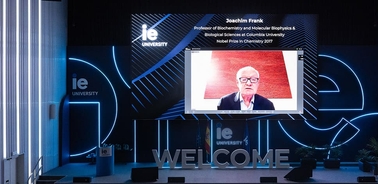IE University Outlines Research Roadmap with Strong Role for IE Sci-Tech

Nobel laureate Joachim Frank stresses science’s global role as IE University commits to doubling research output by 2030.
At the opening of the 2025–26 academic year, IE University unveiled a new research strategy: doubling its faculty body and research output by 2030. The roadmap places research at the center of the institution’s identity and highlights the IE School of Science and Technology (IE Sci-Tech) as a driver of growth in fields such as AI, applied mathematics, climate resilience, and computational social sciences.
Nobel Prize laureate on the Centrality of Science
The opening ceremony featured Joachim Frank, a German-American biophysicist and Nobel Prize in Chemistry 2017 laureate, recognized for developing cryo-electron microscopy, a breakthrough method for imaging biomolecules at atomic resolution. Frank’s keynote underscored the urgency of science and technology in today’s context. He pointed to existential global challenges: climate change, pandemics, energy transitions, and biodiversity loss. For Frank, science provides “a contract shared by the entire planet,” a universal method of inquiry that enables cooperation across borders and political systems.
He cautioned against over-reliance on artificial intelligence at the expense of empirical research. Drawing a parallel to 1905, Einstein’s “Annus Mirabilis”, Frank argued that the assumption of scientific completeness just before major breakthroughs serves as a warning. Concentrating resources exclusively on AI risks narrowing scientific horizons instead of expanding them through new experimentation.
Frank underlined that universities must protect independent research from political or commercial influence and maintain science education as a foundation for future generations.
Sci-Tech’s Expanding Research Ecosystem
IE Sci-Tech’s trajectory aligns with these concerns, as it continues to scale its research capacity and international presence. The school has built interdisciplinary research ecosystems, encouraging faculty and students to collaborate across domains and link fundamental science with applied innovation. Projects range from AI applications in healthcare to robotics, climate, sustainability, and financial systems.
Under Vice Dean for Research David Gómez-Ullate, the IE Research Datalab applies computational technologies to areas such as biology, medicine, healthcare, social sciences, and energy. The team combines expertise in AI, robotics, IoT, blockchain, and computer vision to tackle challenges in biotechnology, neuroscience, smart cities, and environmental science.
The school’s research base is expanding rapidly. Twelve new professors joined last year from institutions such as MIT, Bocconi, CNRS, Columbia, and Carnegie Science, while faculty secured prestigious awards including Plan Nacional, BBVA Foundation, Ramón y Cajal, Horizon Europe, and Marie Curie.
In the past three years, Sci-Tech has expanded by 80% in size, doubled its programs, opened four new labs, and launched the IEX Research Xcelerator to bridge fundamental science and industry. Partnerships with Boehringer Ingelheim, Ripple, and GSK further strengthen its applied research agenda.
Looking Ahead
With IE University’s research roadmap underway, IE Sci-Tech stands at the center of delivering on these ambitions. Its mix of STEM expertise, interdisciplinary projects, and close industry engagement is already shaping IE’s trajectory as a global research university.
In his keynote, Frank noted that this generation inherits a world “much more complicated than the one we grew up in.” He emphasized that the responsibility now rests with today’s students and researchers to sustain a culture of science capable of meeting those challenges. For IE Sci-Tech, it’s a challenge the school is only too ready to take on – with the help of its 2025–26 faculty and student cohort.